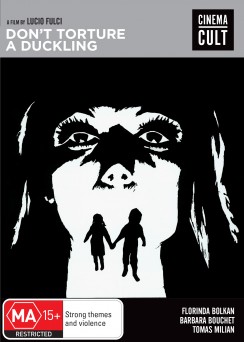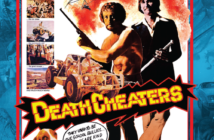Schlock Italian director Lucio Fulci has equally been responsible for remarkable feats of ham fisted cinematic ineptitude, as he has for transcendent surrealistic horror. Whilst “the godfather of gore” is probably best known for his seedy video nasty, the truly disturbing and misogynist New York Ripper, The Beyond on the other hand takes the horror genre and elevates it to delirious existential heights.
1972’s imaginatively titled Don’t Torture a Duckling was made before both of these films, and before Fulci had developed his unique reputation. It’s classic giallo, with a newspaper reporter (Thomas Milan) and the police investigating the brutal murder of young boys in a provincial town. Or it would be if it wasn’t in Fulci’s hands.
Fulci has the ability to find a feverish incoherence amidst what could or perhaps should be a relatively straight tale. His fractured, almost episodic, and frequently jarring narrative is brimming with surreal leaps of logic and weird tangents. Characters interact in a manner that suggest that they have never encountered another human before, or perhaps Fulci and his co writers used some kind of Burroughsian cut up method when constructing the screenplay because describing the dialogue in many scenes as nonsensical is being too generous. The madness may also be due to the fact that the film is dubbed, reasonably poorly, into English. Normally this is a bad thing, however on this occasion it actually assists in creating a further disconnection, adding additional layers of murk, where even the simplest scene is played out for woozy nightmarish incomprehension.
It’s shot remarkably well, with some incredible outdoor locations in the Italian countryside, though it’s Fulci’s roving panning, zooming camera that again unsettles, first confusing before eventually revealing what Fulci intends the viewer to see. It’s shot by Sergio D’ Offizi (Cannibal Holocaust/ House at the Edge of the Park) and features some genuinely unnerving, though quite virtuosic long shots.
The score though, from Riz Ortolani (Cannibal Holocaust) is overought madness, as subtle as a sledgehammer, and to some extent a missed opportunity, screaming ‘this is creepy,’ while the images are already saying that. It’s also turned up ridiculously high in the mix – even by Italian giallo standards. Though all of this may not necessarily be Ortolani’s fault, as the score, with some gentle nods to Morricone and Herrman is at times genuinely suspenseful, it’s just utilised in such a one-dimensional manner. Yet not always. There is one incredibly brutal scene, set to pop music, where Fulci creates an unnerving disparity between sound and vision, displaying a level of sophistication that belies the film’s subject matter.
With broadsides at the Catholic Church, doses of voyeuristic nudity and brutal violence, as well as Fulci’s customary madness, don’t Torture A Duckling is skittering along the edge of coherence, and it’s also one of Fulci’s best.




